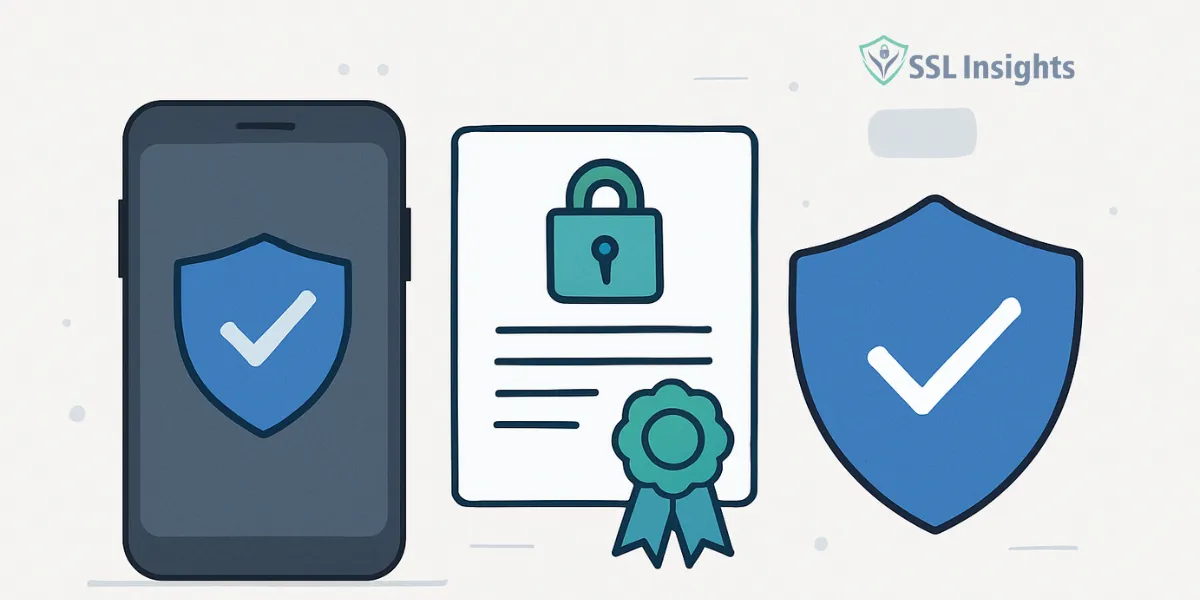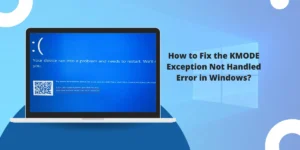Enterprise Mobile Code Signing Certificates represent vital security tools which protect modern applications.
Enterprise Mobile Code Signing Certificates are digital security credentials that authenticate and verify the integrity of mobile applications before distribution. These certificates cryptographically sign mobile apps to confirm they originate from verified publishers and haven’t been tampered with during the distribution process.
The digital world experiences an alarming rise in mobile security threats at an unprecedented pace. The growing number of 7.6 billion smartphone users worldwide and mobile applications serving as main business interfaces creates substantial security demands for enterprises regarding their mobile software distribution processes. Enterprise Mobile Code Signing Certificates serve as essential security tools which authenticate and verify mobile applications running on iOS and Android systems.
Enterprise Mobile Code Signing Certificate Definition and Core Purpose
Organizations use Enterprise Mobile Code Signing Certificates to digitally sign their mobile applications which establishes both their authenticity and maintains their integrity. The digital certificate functions as an authentication stamp which proves both the application’s trusted origin and its unaltered state throughout distribution.
Enterprise mobile certificates differ from standard code signing certificates because they cater to large organizations which require signature capabilities for multiple apps and certificate management across teams while maintaining strict mobile app security protocols.
Enterprise Mobile Code Signing Certificates contain fundamental elements which are essential for their operation.
Core Functionality
Enterprise Mobile Code Signing Certificates deliver multiple vital capabilities to users.
- Digital Signature Creation: Generates unique cryptographic signatures for mobile applications
- Identity Verification: Confirms the publisher’s identity through rigorous validation processes
- Tamper Detection: Alerts users if applications have been modified after signing
- Trust Establishment: Builds user confidence in application authenticity
Technical Specifications
| Component | Description | Validity Period |
| Root Certificate | Primary certificate authority credential | 10-20 years |
| Intermediate Certificate | Secondary validation layer | 5-10 years |
| End-Entity Certificate | Application-specific signing credential | 1-3 years |
| Private Key | Cryptographic key for signature generation | Matches certificate validity |
iOS vs Android Code Signing: Platform-Specific Implementation Guide
iOS Code Signing
All iOS applications need to be signed with certificates that developers obtain through the Apple Developer Program. Enterprise certificates allow organizations to:
- Distribute applications outside the App Store
- Maintain internal app repositories
- Implement custom security policies
- Control application lifecycle management
Android Code Signing
The code signing process of Android operates with flexibility because organizations can select certificates from different Certificate Authorities (CAs). Key features include:
- APK signing for application packages
- Support for multiple signature schemes
- Backward compatibility with older Android versions
- Integration with Google Play Store requirements
The Best Enterprise Mobile Code Signing Certificates 2025
The top Enterprise Mobile Code Signing Certificates for 2025 come from established providers who offer robust security features and support various platforms and sophisticated enterprise capabilities. The top recommendations are:
1. Sectigo Code Signing Certificates
- Sectigo OV Code Signing costs $219.45 per year while EV Code Signing costs $288.20 per year.
- It supports code signing for different platforms including mobile operating systems Android and iOS and Windows and macOS.
- Organization Validation (OV) and Extended Validation (EV) certificate options are available.
- The Timestamping feature enables signatures to remain valid after their linked certificates expire.
- Code Signing provides malware scanning functionality and enables users to link it with SmartScreen filter.
- Sectigo Certificate Manager provides cloud-based certificate management and automation through its Sectigo Certificate Manager platform.
Sectigo Code Signing Certificate
$219.45/yr
OV Code Signing
Displays Verified Publisher Name
Removes Unknown Publisher Warnings
$288.20/yr
EV Code Signing
USB Token Storage
Verified Publisher’s Identity
2. SSL.com Code Signing Certificates
- Affordable options with Organization and Extended Validation certificates.
- com Code Signing certificates supports authentication through Microsoft Authenticode and Java and Adobe.
- The SSL.com provides whitelabel code signing portals together with excellent customer support.
- They provide an optimal combination of price and user-friendliness and security features for enterprise mobile app code signing needs.
SSL.com Code Signing Certificate
$64.50/yr
Trusted Windows Compatibility
FIPS-140-2 Token
Cloud Signing Available
SSL.com EV Code Signing Certificate
$249.00/yr
Hardware Token Storage
Microsoft Reputation Boost
Windows Approved Drivers
3. DigiCert Code Signing Certificates
- DigiCert OV Code Signing at $409.02/yr & EV Code Signing at $576.35/yr
- High-assurance Extended Validation (EV) and Organization Validation (OV) certificates.
- Support for mobile apps as well as Microsoft Authenticode, Java, and more.
- Hardware Security Module (HSM) integration and two-factor authentication for key protection.
- Strong customer support and integration with CI/CD pipelines.
- Best for enterprises needing premium security and broad platform compatibility.
DigiCert Code Signing Certificate
$409.02/yr
Displays Verified Publisher Name
FIPS-140-2 USB Token
Removes Unknown Publisher Warnings
DigiCert EV Code Signing Certificate
$576.35/yr
Issued in 0-3 Days
Unlimited Software Signing
Publisher Identity Vetting
Enterprise Mobile Code Signing Market Statistics and Growth Trends 2025
The enterprise mobile security market shows substantial growth because organizations face rising cyber threats and must comply with regulatory standards:
| Metric | 2025 Value | 2030 Projection | Growth Rate |
| Certificate Authority Market | $208 million | $354 million | 11% CAGR |
| Mobile App Downloads | 258 billion | 367 billion | 7.3% CAGR |
| Enterprise Mobile Users | 1.87 billion | 2.87 billion | 9.0% CAGR |
| Security Breach Incidents | 121 (H1 2021) | Projected 180+ | 8.5% increase |
Enterprise Mobile Code Signing Certificate Implementation Process
Step 1: Certificate Authority Selection
Organizations need to select a trustworthy Certificate Authority which provides enterprise-grade mobile code signing solutions. Key factors include:
- The selection process requires organizations to verify that their chosen Certificate Authority meets Common Criteria and FIPS 140-2 standards.
- The CA supports multiple mobile platforms.
- The system includes features for enterprise management.
- The organization requires technical support together with complete documentation.
Step 2: Identity Verification
The CA conducts extensive identity verification through:
- The verification process includes legal entity validation.
- The process includes domain ownership verification.
- The organization needs to authenticate its identity.
- The organization conducts background checks on all key personnel.
Step 3: Certificate Generation and Deployment
The CA generates the certificate after validation and delivers:
- The process includes private key generation along with secure storage methods.
- The system provides instructions for certificate installation.
- The system integrates with development environments.
- The system includes automated deployment tools.
Step 4: Application Signing Process
The actual signing process involves:
- The process starts with code compilation followed by packaging.
- Digital signature application
- The addition of timestamps ensures long-term validity.
- The system includes verification and testing procedures.
Top Security Benefits of Enterprise Mobile Code Signing Certificates
Enhanced Trust and Credibility
Code signing certificates enhance user trust because they provide visible indicators which verify application authenticity. Users tend to install applications when they show verified publisher information and security warnings for unsigned software.
Malware Prevention
Enterprises can stop malware injection and unauthorized modifications through cryptographic application signing. The annual rise of mobile malware incidents reaches 15% which makes this protection essential.
Compliance Requirements
Code signing serves as a mandatory requirement for various industries to meet their regulatory standards.
- Financial services (PCI DSS)
- Healthcare (HIPAA)
- Government (FISMA)
- Automotive (ISO 26262)
Enterprise Mobile Code Signing Best Practices and Implementation Tips
Certificate Management
Effective certificate management requires:
- Centralized certificate lifecycle management
- Automated renewal processes
- Secure private key storage (HSM recommended)
- Regular security audits and updates
Development Integration
The integration of development workflows should be seamless through:
- CI/CD pipeline integration
- Automated signing processes
- Version control integration
- Testing and validation procedures
Security Policies
The security policies must be complete and cover:
- Key escrow and backup procedures
- Access control and authorization
- Incident response protocols
- Regular security assessments
Common Enterprise Mobile Code Signing Challenges and Solutions
Challenge 1: Certificate Expiration
The solution to this problem is to implement automated monitoring and renewal systems to prevent certificate expiration disruptions.
Challenge 2: Key Management Complexity
Solution: Use Hardware Security Modules (HSMs) for secure key storage and management.
Challenge 3: Multi-Platform Compatibility
Solution: Choose certificates that support both iOS and Android platforms with unified management tools.
Challenge 4: Scalability Issues
Solution: Implement enterprise-grade certificate management platforms that can handle hundreds of applications and certificates.
Future Trends in Enterprise Mobile Code Signing Technology
Emerging Technologies
The enterprise mobile code signing landscape is evolving with:
- Extended Validation (EV) certificates becoming standard
- Two-factor authentication integration
- Cloud-based signing services
- AI-powered threat detection
Regulatory Evolution
New regulations are emerging globally:
- Enhanced privacy requirements (GDPR, CCPA)
- Mandatory security certifications
- Cross-border data transfer restrictions
- Industry-specific compliance updates
Final Thoughts
Enterprise Mobile Code Signing Certificates function as an essential security requirement for organizations that deploy mobile applications in modern times. The rise of cyber threats together with stricter regulations makes robust code signing practices mandatory for businesses to maintain continuity and earn user trust.
Organizations that invest in complete code signing solutions gain strategic advantages in the modern mobile security environment. Enterprise mobile code signing certificates provide essential security benefits through technical protection while meeting regulatory standards and building user trust which makes them vital for contemporary mobile application security strategies.
Enterprises need to implement scalable secure compliant code signing solutions that defend applications and user data as the mobile environment continues to transform.
Frequently Asked Questions (FAQs)
What is a code signing certificate for mobile apps?
A code signing certificate verifies the identity of app developers. The certificate adds a digital signature to mobile applications. This signature confirms the app’s authenticity and prevents unauthorized code modifications.
How much does a code signing certificate cost?
Code signing certificates cost between $150 to $300 per year for standard versions. Enterprise-level certificates range from $300 to $600 annually. Price variations depend on validation levels and certificate features.
How do I get a code signing certificate for my company?
Purchase a certificate from a trusted Certificate Authority. Submit company documentation for identity verification. Install the certificate on your development system after approval.
Why do mobile apps need code signing?
Code signing protects apps from tampering. Users receive confirmation of the developer’s identity. App stores require code signing for app submissions and distribution.
What is the difference between standard and enterprise code signing certificates?
Enterprise certificates allow signing multiple applications. Standard certificates limit signing to one developer. Enterprise certificates offer extended validation and higher security levels.
How long are mobile code signing certificates valid?
Most code signing certificates remain valid for one to three years. Enterprise certificates typically last one year. Certificates require renewal before expiration to maintain app signing capabilities.

Priya Mervana
 Verified Web Security Experts
Verified Web Security Experts
Priya Mervana is working at SSLInsights.com as a web security expert with over 10 years of experience writing about encryption, SSL certificates, and online privacy. She aims to make complex security topics easily understandable for everyday internet users.



